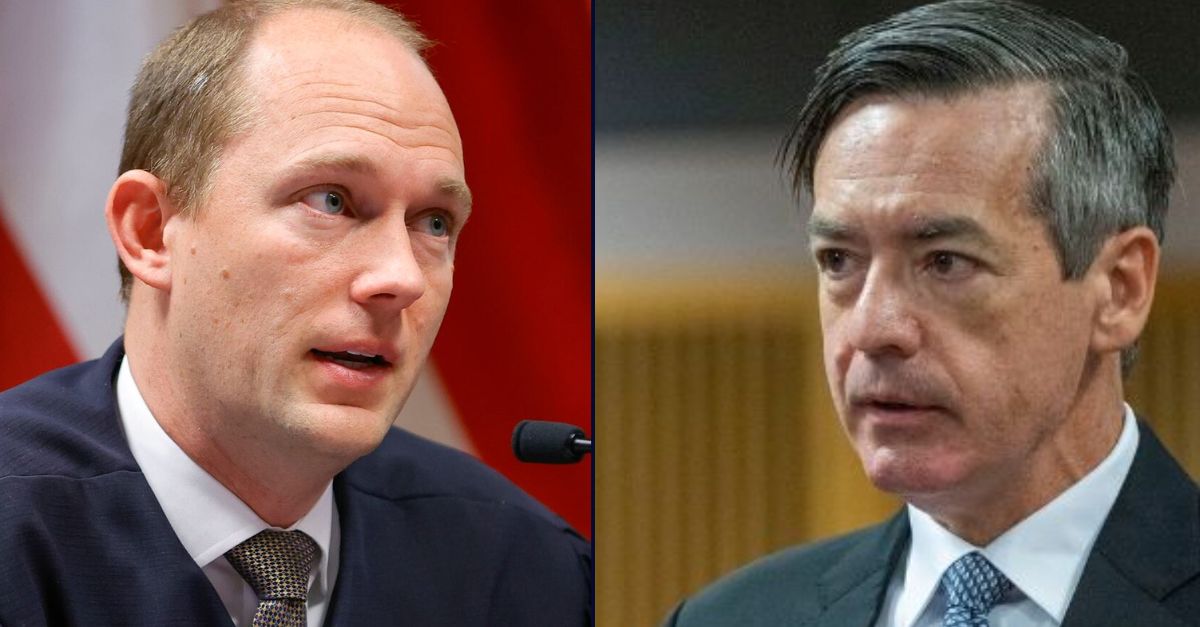
Fulton County Superior Court Judge Scott McAfee is pictured on the left, while Kenneth Chesebro is shown speaking to McAfee in the image on the right. The photo captures a moment during a hearing where Chesebro agreed to a plea deal from the Fulton County district attorney at the Fulton County Courthouse in Atlanta on October 20, 2023.
One quick resolution in the racketeering (RICO) case against President-elect Donald Trump and others was exactly that — a resolution of the case — a judge in Georgia ruled on Friday morning.
Earlier this month, attorney Kenneth Chesebro asked a Peach State trial court to invalidate his guilty plea in the ongoing case.
In a dismissal order, Fulton County Superior Court Judge Scott McAfee nixed that request as procedurally deficient.
Chesebro is widely known as one of the authors of the so-called “coup memos” that offered legal opinions on how the 45th and 47th president could overturn the results of the 2020 presidential election in a “constitutionally defensible manner.” Specifically, the New York attorney was a chief architect of the alternate or “fake” electors plan.
For that plan, Chesebro was charged with a total of seven counts in the wide-ranging indictment filed by embattled Fulton County District Attorney Fani Willis. Those charges included one alleged RICO violation, one count of conspiracy to commit impersonating a public officer, two counts of conspiracy to commit forgery in the first degree, two counts of conspiracy to commit false statements and writing, and one count of conspiracy to commit filing false documents.
Chesebro was one of two co-defendants — along with Texas-based attorney Sidney Powell — who initially invoked their right to a speedy trial, severing their cases from the other 17 co-defendants.
In turn, Chesebro and Powell were lumped together for their vastly different efforts in service of Trump after the 2020 election. So, they both asked to be separated again. Fulton County Superior Judge Scott McAfee denied that request and set their trial date for Oct. 23, 2023.
In the end, both Chesebro and Powell took plea deals.
Days before his case was slated to go to trial, Chesebro pleaded guilty to one count of conspiracy to commit filing false documents — in exchange for Willis dropping the six other counts. As part of his deal, Chesebro agreed to testify for the state against the remaining co-defendants and received a sentence of five years probation, 100 hours of community service and a $5,000 fine.
Using a plea in bar, Chesebro recently pointed out that the crime he pleaded guilty to was subsequently invalidated by the trial court.
On Sept. 12, McAfee quashed three counts — 14, 15, and 27 — under the doctrine of federal preemption, explaining that an 1890 U.S. Supreme Court decision stylized as In re Loney “preempts the State’s ability to prosecute perjury and false filings in a federal district court.”
In the defense motion, Chesebro’s attorney cited Georgia law to argue that “a defendant cannot plead guilty to a charge that does not constitute a crime.” And, the defense argued, subsequent trial court proceedings rendered the false document conspiracy charge dead letter.
In the Friday order, McAfee said the plea in bar was too little, too late. And, specifically, the wrong way to contest the conviction.
“Procedurally defective in more ways than one, the motion is dismissed,” the judge writes. “At the outset, the undersigned concludes that the Defendant’s invoked remedy is entirely inapt.”
In any event, the judge says, a plea in bar is not used, and cannot be used, after someone has already been convicted.
“Defendant’s sole citation in support of his contention that a plea in bar is a post-conviction remedy, rather than a form of pretrial challenge, does not suggest otherwise,” McAfee goes on.
The judge cites Peach State case law that explains the only options available for a similarly situated post-conviction challenge:
[W]here the time for filing a direct appeal from the criminal conviction or a motion for new trial has expired, a defendant attacking his underlying conviction is limited to the traditionally recognized proceedings of an extraordinary motion for new trial, a motion to withdraw his guilty plea, a motion in arrest of judgment, or a petition for habeas corpus.
Without going through each of those methods, McAfee says Chesebro is not entitled to an arrest of judgment because the statute he pleaded guilty under resulted in something akin to deferred adjudication — a process where a charge remains pending while a defendant completes the sentence. This, the judge notes, is a form of judicial leniency available to first-time offenders. The upshot, according to the court, is that there was no “judgment” of guilt in Chesebro’s case — so there is no judgment that can be dismissed.
And, anyway, the time has passed, the judge says.
“Setting that aside, a motion in arrest of judgment must be filed during the term when the judgment was entered,” the order continues. “If untimely filed, the trial court lacks jurisdiction and the motion must be dismissed. The Defendant’s convictions were entered October 23, 2023, during the September/October term of the Fulton County Superior Court that expired November 6, 2023. The Defendant filed this motion over a year later, well after the expiration of the term in which he was convicted. The motion, to the extent he had a right to pursue one at all, is therefore untimely.”
McAfee also rubbishes the notion that Chesebro could request a new trial because “there was no trial” in the first place.
Finally, the judge says he simply does not have the authority to do what the defendant is requesting here because the punishment meted out was not in any way illegal under Georgia statutes.
“This Court lacks jurisdiction to grant the requested relief,” McAfee concludes. “The motion is dismissed.”
Chesebro’s attorney, Manny Arora, is undaunted by the result.
In an email to Law&Crime, the defense attorney expressed confidence that the Friday ruling was only a hiccup on a longer journey — and one that was, in some ways, anticipated.
“The motion was denied on procedural grounds and not on merit,” Arora said. “Count 15 is invalid; however in order for us to get that remedy, we will have to proceed with the longer route of civil habeas corpus. We acknowledged in our motion that the basis for relief may have some procedural hurdles and the Judge pointed those out in his order. Again, the key is that the judge denied our motion on jurisdictional grounds, not on merit.”






